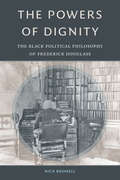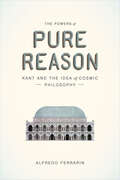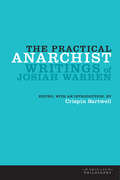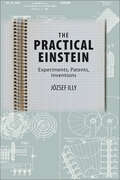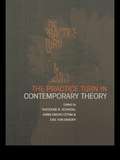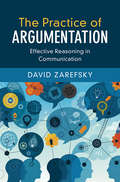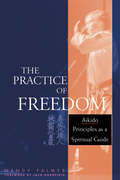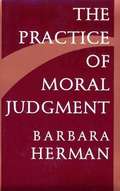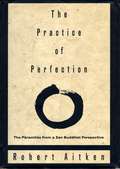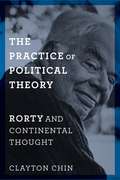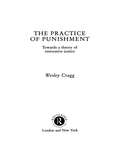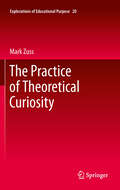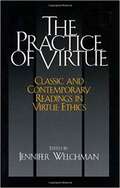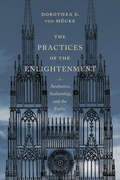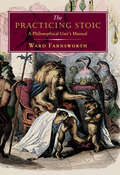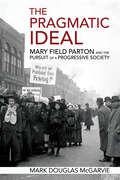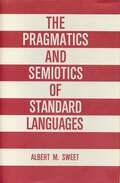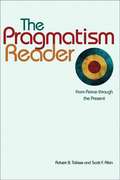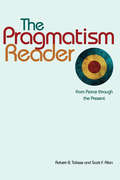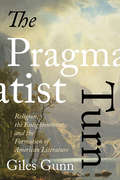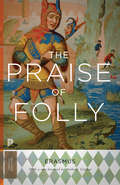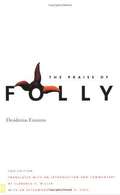- Table View
- List View
The Powers of Dignity: The Black Political Philosophy of Frederick Douglass
by Nick BromellIn The Powers of Dignity Nick Bromell unpacks Frederick Douglass's 1867 claim that he had “elaborated a political philosophy” from his own “slave experience.” Bromell shows that Douglass devised his philosophy because he found that antebellum Americans' liberal-republican understanding of democracy did not provide a sufficient principled basis on which to fight anti-Black racism. To remedy this deficiency, Douglass deployed insights from his distinctively Black experience and developed a Black philosophy of democracy. He began by contesting the founders' racist assumptions about humanity and advancing instead a more robust theory of “the human” as a collection of human “powers.” He asserted further that the conscious exercise of those powers is what confirms human dignity and that human rights and democracy come into being as ways to affirm and protect that dignity. Thus, by emphasizing the powers and the dignity of all citizens, deriving democratic rights from these, and promoting a remarkably activist, power-oriented model of citizenship, Douglass's Black political philosophy aimed to rectify two major failings of US democracy in his time and ours: its complacence and its racism.
The Powers of Pure Reason: Kant and the Idea of Cosmic Philosophy
by Alfredo FerrarinThe Critique of Pure Reason--Kant’s First Critique--is one of the most studied texts in intellectual history, but as Alfredo Ferrarin points out in this radically original book, most of that study has focused only on very select parts. Likewise, Kant’s oeuvre as a whole has been compartmentalized, the three Critiques held in rigid isolation from one another. Working against the standard reading of Kant that such compartmentalization has produced, The Powers of Pure Reason explores forgotten parts of the First Critique in order to find an exciting, new, and ultimately central set of concerns by which to read all of Kant’s works. Ferrarin blows the dust off of two egregiously overlooked sections of the First Critique--the Transcendental Dialectic and the Doctrine of Method. There he discovers what he argues is the Critique’s greatest achievement: a conception of the unity of reason and an exploration of the powers it has to reach beyond itself and legislate over the world. With this in mind, Ferrarin dismantles the common vision of Kant as a philosopher writing separately on epistemology, ethics, and aesthetics and natural teleology, showing that the three Critiques are united by this underlying theme: the autonomy and teleology of reason, its power and ends. The result is a refreshing new view of Kant, and of reason itself.
The Practical Anarchist: Writings of Josiah Warren (American Philosophy)
by Crispin SartwellThe Practical Anarchist brings to light the work of Josiah Warren, eccentric American genius. Devoting his life to showing the practicality of an astonishing ideal, Warren devoted equal industry to the question of how to make a pair of shoes and how to remake the social world into an individualist paradise.This will be the first chance for many readers to encounter Warren’s writings, and in many cases their first publication since their original appearance in obscure, self-published periodicals, including The Peaceful Revolutionist (1833), the first American anarchist periodical. Moreover, they often appeared in a bizarre experimental typography.This volume presents, out of the welter of bewildering writings left by Warren, a reading text designed for today’ readers and students. It seeks to convey the practical value of many of Warren’s ideas, their continuing relevance.
The Practical Einstein: Experiments, Patents, Inventions
by József Illy2012 Outstanding Academic Title, Choice MagazineAlbert Einstein may be best known as the wire-haired whacky physicist who gave us the theory of relativity, but that’s just one facet of this genius’s contribution to human knowledge and modern science. As József Illy expertly shows in this book, Einstein had an eminently practical side as well.As a youth, Einstein was an inveterate tinkerer in the electrical supply factory his father and uncle owned and operated. His first paid job was as a patent examiner. Later in life, Einstein contributed to many inventions, including refrigerators, microphones, and instruments for aviation. In published papers, Einstein often provided ways to test his theories and fundamental problems of the scientific community of his times. He delved deeply into a variety of technological innovations, most notably the gyrocompass, and consulted for industry in patent cases and on other legal matters. Einstein also provided explanations for common and mundane phenomena, such as the meandering of rivers. In these and other hands-on examples culled from the Einstein Papers, Illy demonstrates how Einstein enjoyed leaving the abstract world of theories to wrestle with the problems of everyday life.While we may like the idea of Einstein as a genius besotted by extra dimensions and too out-of-this-world to wear socks, The Practical Einstein gives ample evidence that this characterization is both incomplete and an unfair representation of a man who sought to explore the intricacies of nature, whether in theory or in practice.
The Practice Turn in Contemporary Theory
by Theodore R. Schatzki Karin Knorr Cetina Eike Von SavignyThis book provides an exciting and diverse philosophical exploration of the role of practice and practices in human activity. It contains original essays and critiques of this philosophical and sociological attempt to move beyond current problematic ways of thinking in the humanities and social sciences. It will be useful across many disciplines, including philosophy, sociology, science, cultural theory, history and anthropology.
The Practice of Argumentation: Effective Reasoning in Communication
by David ZarefskyThis book uses different perspectives on argumentation to show how we create arguments, test them, attack and defend them, and deploy them effectively to justify beliefs and influence others. David Zarefsky uses a range of contemporary examples to show how arguments work and how they can be put together, beginning with simple individual arguments, and proceeding to the construction and analysis of complex cases incorporating different structures. Special attention is given to evaluating evidence and reasoning, the building blocks of argumentation. Zarefsky provides clear guidelines and tests for different kinds of arguments, as well as exercises that show student readers how to apply theories to arguments in everyday and public life. His comprehensive and integrated approach toward argumentation theory and practice will help readers to become more adept at critically examining everyday arguments as well as constructing arguments that will convince others.
The Practice of Freedom
by Wendy Palmer Jack KornfieldIn The Practice of Freedom, American sensei Wendy Palmer applies the basic principles of aikido to the conduct of everyday life. This fifth-degree black belt describes her own fascinating journey, one that includes caring for a mother with multiple sclerosis, teaching inmates in a women's federal prison, and the development her own method of meditation called Conscious Embodiment. In the process Palmer uses her many years of aikido practice to explore and respond to a simple but potent question: How? How can we maintain our vitality and integrity in times of stress? How do we transform our negativity into budo, or love? And how do we move from "stuckness" to freedom?
The Practice of Freedom
by Wendy PalmerIn The Practice of Freedom, American sensei Wendy Palmer applies the basic principles of aikido to the conduct of everyday life. This fifth-degree black belt describes her own fascinating journey, one that includes caring for a mother with multiple sclerosis, teaching inmates in a women's federal prison, and the development her own method of meditation called Conscious Embodiment. In the process Palmer uses her many years of aikido practice to explore and respond to a simple but potent question: How? How can we maintain our vitality and integrity in times of stress? How do we transform our negativity into budo, or love? And how do we move from "stuckness" to freedom?
The Practice of Moral Judgment
by Barbara HermanShe urges us to abandon the tradition that describes Kantian ethics as a deontology, a moral system of rules of duty. She finds the central idea of Kantian ethics not in duty but in practical rationality as a norm of unconditioned goodness. This book both clarifies Kant's own theory and adds programmatic vitality to modern moral philosophy.
The Practice of Perfection: The Paramitas from a Zen Buddhist Perspective
by Robert AitkenRobert Aiken, author of Encouraging Words and Taking the Path of Zen, is America's most senior Zen Roshi. In this new book he presents the Ten Pãramitãs, of Transcendental Perfections--namely, giving, mortality, forbearance, zeal, focused meditation, wisdom, compassionate means, aspiration, spiritual power, and knowledge--two-thousand-year-old ideals that can serve us as both methods and goals. The Pãramitãs are the "skillful means" a person may employ to nurture and develop his or her spiritual and moral life. In religious instruction we are often met be restrictions, and are told what not to do. The Pãramitãs, explained from a Zen perspective, offer the seeker ten positive means of action, ten ways to live a life of clarity and grace in a modern world where neither seems easy or even possible. The transcendental perfections can lead us toward a life that is both spiritually invigorated and socially engaged. Aitken Roshi's way of teaching--anecdotal, careful, insightful, and easily accessible--leads us further along the path of harmony and balance. Each of the inspiring and instructional essays in this book is followed by a section in which Aitken answers questions most often asked by his own students in their course of study. The Practice of Perfection will be useful to seekers of all cultures and faiths.
The Practice of Political Theory: Rorty and Continental Thought (New Directions in Critical Theory #60)
by Clayton ChinRecent political thought has grappled with a crisis in philosophical foundations: how do we justify the explicit and implicit normative claims and assumptions that guide political decisions and social criticism? In The Practice of Political Theory, Clayton Chin presents a critical reconstruction of the work of Richard Rorty that intervenes in the current surge of methodological debates in political thought, arguing that Rorty provides us with unrecognized tools for resolving key foundational issues.Chin illustrates the significance of Rorty’s thought for contemporary political thinking, casting his conception of “philosophy as cultural politics” as a resource for new models of sociopolitical criticism. He juxtaposes Rorty’s pragmatism with the ontological turn, illuminating them as alternative interventions in the current debate over the crisis of foundations in philosophy. Chin places Rorty in dialogue with continental philosophy and those working within its legacy. Focused on both important questions in pragmatist scholarship and central issues in contemporary political thought, The Practice of Political Theory is an important response to the vexed questions of justification and pluralism.
The Practice of Punishment: Towards a Theory of Restorative Justice
by Wesley CraggThis study focuses on the practice of punishment, as it is inflicted by the state. The author's first-hand experience with penal reform, combined with philosophical reflection, has led him to develop a theory of punishment that identifies the principles of sentencing and corrections on which modern correctional systems should be built. This new theory of punishment is built on the view that the central function of the law is to reduce the need to use force in the resolution of disputes. Professor Cragg argues that the proper role of sentencing and sentence administration is to sustain public confidence in the capacity of the law to fulfil that function. Sentencing and corrections should therefore be guided by principles of restorative justice. He points out that, although punishment may be an inevitable concomitant of law enforcement in general and sentencing in particular, inflicting punishment is not a legitimate objective of criminal justice. The strength and appeal of this account is that it moves well beyond the boundaries of conventional discussions. It examines punishment within the framework of policing and adjudication, analyses the relationship between punishment and sentencing, and provides a basis for evaluating correctional practices and such developments as electronic monitoring.
The Practice of Theoretical Curiosity
by Mark ZussThe desire for knowledge is an abiding facet of human experience and cultural development. This work documents curiosity as a sociohistorical force initiating research across the disciplines. Projects generated by theoretical curiosity are presented as historical and material practices emerging as expressions of embodied knowledge and experience. The shifting cultural, philosophical and practical relations between theory and curiosity are situated within classical, medieval, early modern and contemporary communities of practice. The Practice of Theoretical Curiosity advocates for a critical, aesthetic engagement in everyday life. Its purpose is to examine the pedagogical grounds and questions that motivate research programs in the sciences, education, technoculture and post-war social movements. Theoretical curiosity continually resists disciplinary limits. It is a core, embodied process uniting human pursuits of knowledge and power. This inquiry into inquiry itself offers an appreciation of the vital continuity between the senses, perception, and affect and concept development. It is informed by a critical reading of phenomenology as the embodied practice of researchers. This study sponsors a deepening of theory in practice and the practice of theoretical exploration. As a contribution to pedagogical practice, it offers a historical critique of the usually unquestioned philosophical, political and ethical grounds for educational, scientific and social research. The Practice of Theoretical Curiosity profiles significant alliances and persona as agents for the pursuit of novel and often controversial research, adventures and discovery. It claims that the place of technology and the technical is the primary channel for contemporary inquiry. The technosciences of genomics, artificial life and astrobiology are considered as contemporary extensions of a perennial desire to pursue and resist the limits of existing knowledge and representation.
The Practice of Virtue: Classic and Contemporary Readings in Virtue Ethics
by Jennifer WelchmanThis collection provides readings from five classic thinkers with importantly distinct approaches to virtue theory, along with five new essays from contemporary thinkers that apply virtue theories to the resolution of practical moral problems. Jennifer Welchman's Introduction discusses the history of virtue theory. A short introduction to each reading highlights the distinctive aspects of the view expressed.
The Practices of the Enlightenment: Aesthetics, Authorship, and the Public (Columbia Themes in Philosophy, Social Criticism, and the Arts)
by Dorothea Von MückeRethinking the relationship between eighteenth-century Pietist traditions and Enlightenment thought and practice, The Practices of Enlightenment unravels the complex and often neglected religious origins of modern secular discourse. Mapping surprising routes of exchange between the religious and aesthetic writings of the period and recentering concerns of authorship and audience, this book revitalizes scholarship on the Enlightenment.By engaging with three critical categories—aesthetics, authorship, and the public sphere—The Practices of Enlightenment illuminates the relationship between religious and aesthetic modes of reflective contemplation, autobiography and the hermeneutics of the self, and the discursive creation of the public sphere. Focusing largely on German intellectual life, this critical engagement also extends to France through Rousseau and to England through Shaftesbury. Rereading canonical works and lesser-known texts by Goethe, Lessing, and Herder, the book challenges common narratives recounting the rise of empiricist philosophy, the idea of the "sensible" individual, and the notion of the modern author as celebrity, bringing new perspective to the Enlightenment concepts of instinct, drive, genius, and the public sphere.
The Practicing Stoic: A Philosophical User's Manual
by Ward FarnsworthStoicism is the most helpful and practical philosophy ever devised. Its intention is to help people find happiness by thinking differently about their lives and their problems. The advice the Stoics provided centuries ago is still the best anyone has offered, and it’s as useful today as it was then—or more. When anyone today says something really wise, the Stoics usually said it first. Today the word “stoicism” is often used to mean suffering without complaint, but the true ideas, and ideals, of the Stoics are far more powerful and interesting. Stoicism means knowing the difference between what we can control and we can’t, and not worrying about the latter. The Stoics were masters of perspective, always taking the long view while remembering that life is short. And they were deep and insightful students of human nature, understanding how we manage to make ourselves miserable as well as how we seek and can find fulfillment. The great insights of the Stoics are spread over a wide range of ancient sources. This book brings them all together for the first time. It systematically presents what the various Stoic philosophers said on every important topic, accompanied by an eloquent commentary that is clear and concise. The result is a set of philosophy lessons for everyone—the most valuable wisdom of ages past made available for our times, and for all time.
The Pragmatic Enlightenment
by Dennis C. RasmussenThis is a study of the political theory of the Enlightenment, focusing on four leading eighteenth-century thinkers: David Hume, Adam Smith, Montesquieu, and Voltaire. Dennis C. Rasmussen calls attention to the particular strand of the Enlightenment these thinkers represent, which he terms the "pragmatic Enlightenment. " He defends this strand of Enlightenment thought against both the Enlightenment s critics and some of the more idealistic Enlightenment figures who tend to have more followers today, such as John Locke, Immanuel Kant, and Jeremy Bentham. Professor Rasmussen argues that Hume, Smith, Montesquieu, and Voltaire exemplify an especially attractive type of liberalism, one that is more realistic, moderate, flexible, and contextually sensitive than most other branches of this tradition.
The Pragmatic Ideal: Mary Field Parton and the Pursuit of a Progressive Society
by Mark Douglas McGarvieFollowing the life of a charismatic woman committed to reform, The Pragmatic Ideal provides an introduction to the politics that dominated the early decades of the twentieth century, ideas that are the basis for much of today's progressive thought. As one of the "new women" who came of age during the Progressive era, Mary Field Parton, a close friend of Clarence Darrow, pursued social justice as a settlement house worker and as a leading writer on labor organizing, transforming pragmatic principles into action.Mark Douglas McGarvie shows how, following the upheavals of the late nineteenth and early twentieth centuries, liberals such as Mary Field Parton turned to pragmatism, hoping to generate greater social awareness from constructions of values rooted in personal experiences instead of philosophical or religious truths. The Pragmatic Ideal reveals how Mary Field Parton sought to expand her rights as a woman while nonetheless denigrating rights as artificial legal impediments to social progress. The issues she faced and the options she considered find important currency in the political divisions confronting Americans a century later.
The Pragmatic Mind: Explorations in the Psychology of Belief
by Mark BauerleinThe Pragmatic Mind is a study of the pragmatism of Emerson, James, and Peirce and its overlooked relevance for the neopragmatism of thinkers like Richard Rorty, Stanley Cavell, Stanley Fish, and Cornel West. Arguing that the "original" pragmatists are too-often cited casually and imprecisely as mere precursors to this contemporary group of American intellectuals, Mark Bauerlein explores the explicit consequences of the earlier group's work for current debates among and around the neopragmatists.Bauerlein extracts from Emerson, James, and Peirce an intellectual focus that can be used to advance the broad social and academic reforms that the new pragmatists hail. He claims that, in an effort to repudiate the phony universalism of much contemporary theory, the new generation of theorists has ignored the fact that its visions of pragmatic action are grounded in this "old" school, not just in a way of doing things but also in a way of thinking about things. In other words, despite its inclination to regard psychological questions as irrelevant, Bauerlein shows that the pragmatic method demands a pragmatic mind--that is, a concept of cognition, judgment, habit, and belief. He shows that, in fact, such a concept of mind does exist, in the work of the "old" pragmatists.
The Pragmatics and Semiotics of Standard Languages (G - Reference, Information and Interdisciplinary Subjects)
by Albert SweetSweet describes the pragmatic foundations of standard logic and applies these foundations to the task of developing a theory of intended models as an extension of standard model theory in which the relevant "intending" is represented pragmatically. Methods of formal logic are used to investigate the structure of the relation between language and the world. The truism which holds that this relation includes the speaker as well as the object spoken about is formally explicated and applied to the problem of illuminating one of the deepest phenomena in standard model theory: the existence of non-isomorphic models of complete theories. To this end it is shown that standard logic admits pragmatic foundations upon which a theory of intended models can be built as an extension of standard model theory. The relevant "intending" is represented by the very forms of verbal behavior which determine the grammatical and logical structure of the sentences whose referential meaning is in question. The uniqueness properties of the class of intended models may then be described.The first section of the book states the immediate goal of standard pragmatics as that of recovering the algebraic structure first-order logic by means of a purely pragmatic construction. The second section, the major portion of the work, then provides the foundation for a semiotic theory of intended models and referential meaning. The theory is then applied to the problem of referential indeterminancy, which has been associated with the phenomenon of scientific revolutions. The theory is also applied to the problem of the apparent synonymy of observationally equivalent theories. Sweet concludes that such theories are not referentially synonymous in any natural sense which is analogous to the paradigm sense in which theories of alternative scales of measurement are referentially synonymous.A novel feature of this book is the formal explication of the idea that the factors, pragmatical in nature, which distinguish the actual meaning of a sentence from among its possible meanings, whose range is defined by the manner in which the sentence is parsed, determine that very parsing. Applicability to natural language of the model-theoretic semantics thereby obtained is made possible by another feature of the book: the development of a theory of locally standard grammar which provides the foundation for representing the structure of natural language as that of standard first-order logic, in a local, as distinguished from a global, sense.This book is intended for scholars in logic, semiotics, and the philosophies of language and of science. Those concerned specifically with such philosophers as Peirce, Martin, and Davidson will also find the study valuable.
The Pragmatism Reader: From Peirce Through the Present
by Robert B. Talisse Scott F. AikinThe Pragmatism Reader is the essential anthology of this important philosophical movement. Each selection featured here is a key writing by a leading pragmatist thinker, and represents a distinctively pragmatist approach to a core philosophical problem. The collection includes work by pragmatism's founders, Charles Peirce, William James, and John Dewey, as well as seminal writings by mid-twentieth-century pragmatists such as Sidney Hook, C. I. Lewis, Nelson Goodman, Rudolf Carnap, Wilfrid Sellars, and W.V.O. Quine. This reader also includes the most important work in contemporary pragmatism by philosophers like Susan Haack, Cornel West, Hilary Putnam, Richard Rorty, Cheryl Misak, and Robert Brandom. Each selection is a stand-alone piece--not an excerpt or book chapter--and each is presented fully unabridged. The Pragmatism Reader challenges the notion that pragmatism fell into a midcentury decline and was dormant until the advent of "neopragmatism" in the 1980s. This comprehensive anthology reveals a rich and highly influential tradition running unbroken through twentieth-century philosophy and continuing today. It shows how American pragmatist philosophers have contributed to leading philosophical debates about truth, meaning, knowledge, experience, belief, existence, justification, and freedom.
The Pragmatism Reader: From Peirce through the Present
by Robert B. Talisse Scott F. AikinThe Pragmatism Reader is the essential anthology of this important philosophical movement. Each selection featured here is a key writing by a leading pragmatist thinker, and represents a distinctively pragmatist approach to a core philosophical problem. The collection includes work by pragmatism's founders, Charles Peirce, William James, and John Dewey, as well as seminal writings by mid-twentieth-century pragmatists such as Sidney Hook, C. I. Lewis, Nelson Goodman, Rudolf Carnap, Wilfrid Sellars, and W.V.O. Quine. This reader also includes the most important work in contemporary pragmatism by philosophers like Susan Haack, Cornel West, Hilary Putnam, Richard Rorty, Cheryl Misak, and Robert Brandom. Each selection is a stand-alone piece--not an excerpt or book chapter--and each is presented fully unabridged. The Pragmatism Reader challenges the notion that pragmatism fell into a midcentury decline and was dormant until the advent of "neopragmatism" in the 1980s. This comprehensive anthology reveals a rich and highly influential tradition running unbroken through twentieth-century philosophy and continuing today. It shows how American pragmatist philosophers have contributed to leading philosophical debates about truth, meaning, knowledge, experience, belief, existence, justification, and freedom. Covers pragmatist philosophy from its origins to today Features key writings by the leading pragmatist thinkers Demonstrates the continuity and enduring influence of pragmatism Challenges prevailing notions about pragmatism Includes only stand-alone pieces, completely unabridged Reflects the full range of pragmatist themes, arguments, concerns, and commitments
The Pragmatist Turn: Religion, the Enlightenment, and the Formation of American Literature (Studies in Religion and Culture)
by Giles GunnIn The Pragmatist Turn, renowned scholar of American literature and thought Giles Gunn offers a new critical history of the way seventeenth-century religion and the eighteenth-century Enlightenment influenced the formation of subsequent American writing. This shaping was dependent on their pragmatic refiguration less as systems of belief and thought than as frames of reflection and structures of feeling, what he calls spiritual imaginaries.Drawing on a large number of figures from earlier periods and examining how they influenced generations of writers from the nineteenth century into the early twenty-first —including Henry Adams, Frederick Douglass, Emily Dickinson, Herman Melville, William James, Henry James, Kenneth Burke, and Toni Morrison—Gunn reveals how the idea or symbolic imaginary of "America" itself was drastically altered in the process.As only a seasoned scholar can, Gunn here presents the history of American religion and literature in broad strokes necessary to reveal the seismic philosophical shifts that helped form the American canon.
The Praise of Folly
by Anthony Grafton Desiderius ErasmusDesiderius Erasmus (1466-1536) was a Dutch humanist, scholar, and social critic, and one of the most important figures of the Renaissance. The Praise of Folly is perhaps his best-known work. Originally written to amuse his friend Sir Thomas More, this satiric celebration of pleasure, youth, and intoxication irreverently pokes fun at the pieties of theologians and the foibles that make us all human, while ultimately reaffirming the value of Christian ideals. No other book displays quite so completely the transition from the medieval to the modern world, and Erasmus's wit, wisdom, and critical spirit have lost none of their timeliness today.This Princeton Classics edition of The Praise of Folly features a new foreword by Anthony Grafton that provides an essential introduction to this iridescent and enduring masterpiece.
The Praise of Folly (Yale Nota Bene)
by Desiderius ErasmusThe Praise of Folly has enjoyed enormous and highly controversial success from the author’s lifetime down to our own day.It has no rival, except perhaps Thomas More’s Utopia, as the most intense and lively presentation of the literary, social, and theological aims and methods of Northern Humanism.
